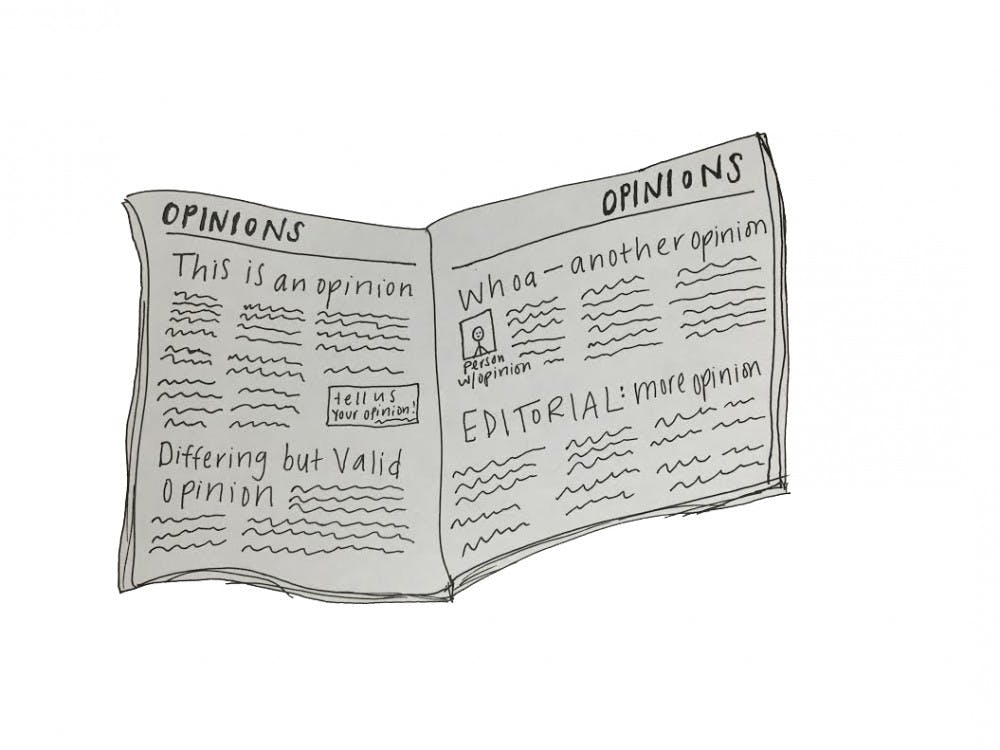It’s there in print, on the top right-hand side of this page, in bold, white, Oswald: O-P-I-N-I-O-N-S. There’s a tab online, too. But in case you missed it: This is the Opinions section and the Opinions section contains opinions.
There is reason behind my redundancy. As Elon News Network’s opinions editor, I often have to remind impassioned emailers that there is a defined line between “opinion” and “news” and that, shockingly, we allow our opinionated columnists and contributors the freedom to express their informed opinions in the Opinions section.
The section thrives when a meaningful exchange of ideas takes place, it exists to provide readers with the opportunity to react to issues, and it allows the public to hold news organizations accountable by providing a venue for Letters to the Editor.
What that looks like for me, as editor: publishing opinions that are grounded on factually correct information — even if I fundamentally disagree. In other words, that means I am publishing content that sometimes warrants a “yaaaas” and other times warrants a “yikes.” When members of the community react to a Campus Voices piece, that means I defend the contributor’s right to an opinion and our editorial decision to publish it, and I encourage people to bring their concerns to the public forum by writing a counter-piece or rebuttal. In a gist, that’s what the Opinions Section is.
But let’s focus on what the Opinions section is not: Opinions are inherently not facts (though they are derived from facts). And more importantly, Opinions content is not news. And it’s vital to recognize the difference.
Though, the line between “news” and “opinions” is over 170 years old — with many crediting Horace Greeley for inventing the idea of designating a separate page for opinions to distinguish “opinion writing” from “news reports” in 1841 — people blur them far too often, especially in this digital age.
Far too often, columns are confused for news articles. No, that Odyssey Online “article” you shared on your Facebook timeline is not news. No, Nicholas Kristof doesn’t represent the views of the New York Times. And no, our decisions to publish conservative or liberal columns or Campus Voices pieces do not mean we are actively seeking or celebrating a certain political opinion.
Far too often, media organizations are branded by the political leaning of the columnists they syndicate. And to the disdain of every professor who specializes in media literacy, confusion even exists among journalists — both professional and aspiring.
I’ve had to remind some of my colleagues at ENN, who I feel are sometimes quick to dismiss the value of the section because they believe it undermines our ability to remain “objective,” that it exists and operates differently in journalism, and it’s important that we recognize, remember and celebrate that.
I’m met with rolling eyes, of course. Because let’s face it, “news matters most.” But the Opinions section plays an imperative role now more than ever.
In a society where consumers and professionals often blur the lines themselves through the content they share or create, it is vital to define a particular space in media that welcomes opinion journalism.
By doing so, we can better identify spaces that do not — like, you know, the news section.
And in a time when anybody can sit behind a screen and share hurtful opinions grounded on inaccurate information through tweets or Facebook statuses, we must celebrate a space where opinions are filtered for accuracy and carefully fact-checked. Columnists devote hours constructing their opinions responsibly by considering different sides of the issue. Copy editors spend hours fact-checking them.
Separate from news but not less significant — and, more importantly, still journalism.
But anyway, that’s just my opinion. And that is precisely why it sits — proudly — here in the Opinions section under bold, white, Oswald.


